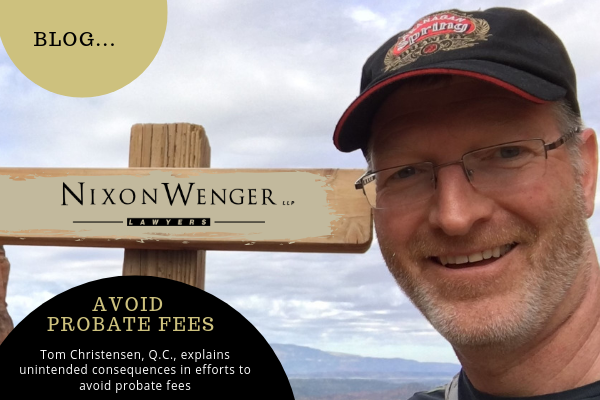
Probate fees are fees paid to the province to obtain a Grant of Probate from the British Columbia Supreme Court when a person dies. The fee is based on the value of the deceased person’s assets and can be generally estimated at 1.4% of the value of the assets. There are some adjustments, but the 1.4% provides a small overestimate of the fee. A Grant of Probate is generally required to enable the Executor to sell or otherwise deal with the deceased person`s assets.
However, not all of a person`s assets while alive may form part of that person`s estate and require a Grant of Probate to enable transfer. For example, an RRSP, RRIF, or TFSA that designates a beneficiary who survives the deceased person, will transfer directly to that beneficiary and not form part of the deceased`s estate that is subject to probate. Life insurance naming a beneficiary will go to the named beneficiary and not become part of the estate. And assets that are owned with one or more other persons as joint tenants can pass to the surviving joint tenants rather than to the estate.
Owning assets as joint tenants is a common circumstance for spouses. Most couples will own their home as joint tenants, have joint bank accounts, and often own vehicles jointly. For most couples*, it makes sense to also name the spouse as beneficiary for life insurance, RRSPs, RRIFs, and TFSAs. Consequently, upon the death of one spouse, all assets may transfer to the surviving spouse without the need to obtain a Grant of Probate.
Given the savings of time and money in avoiding a need for probate when the first spouse dies, we find that many surviving spouses are interested in adding children to title to a home or recreational property, or to bank accounts, in an effort to avoid future probate fees. While that can be effective to avoid probate, the transfer of ownership has many consequences that may not be intended.
Adding another person to title, or to a bank account, is a transfer of ownership. If the asset were a recreational property or an investment account, the transfer will be a disposition for income tax purposes and may trigger an obligation to pay capital gains tax. If you add a child to title to your principal residence and that child does not live in the residence, capital gains tax could become payable on part of the future increase in value of the home as part of the principal residence exemption may be lost. Once ownership is changed, control is lost, such that any future decision regarding a home or recreational property, including whether or not to sell or mortgage it, will require agreement of all owners. The asset would also be at risk of a claim by any creditors of the person that was added as an owner as well as claims by that person’s spouse in a family law claim.
Notwithstanding the consequences of adding a joint owner to an asset, there are circumstances where it is a good planning option. It is most important to clearly understand both the intended and unintended consequences of any change of ownership of any asset, and to clearly document the intent of any change. If one child is added to a bank account, should the balance of that account go to that child upon your death or do you intend that the balance be split among all your children. Future disputes can be avoided or minimized if intentions are well documented. A failure to properly document intentions often results in lengthy disputes that are expensive and permanently damage family relationships.
Probate fees are significant enough that it makes sense to at least consider options to avoid the need to obtain a grant of probate. But any changes in ownership should only be undertaken after careful consideration of the consequences of such change within the context of a person`s overall estate plan, and taking into account family dynamics that may create greater risks. All of these factors require a good conversation with your legal advisor to ensure any effort to save probate fees does not create problems that will be much more expensive and damaging to address.
*There are exceptions as each family is unique. You should seek legal advice that reflects your individual circumstances when planning for the eventual disposition of your assets upon death.
Tom Christensen, Q.C., has a general solicitor’s practice, assisting clients with business matters, wills and incapacity planning, the administration of estates, and real estate conveyancing and financing matters. He has a particular interest in assisting families with the transition of assets from one generation to the next through effective personal and business succession planning as well as resolving estate disputes outside of court.

